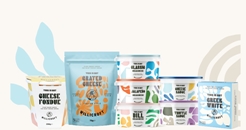 Putting nature at the core of business strategy
Putting nature at the core of business strategy
From an article by Pioneer Post
Amsterdam Impact, the City of Amsterdam’s impact entrepreneurship initiative, aims to connect international impact ecosystems and strengthen Amsterdam’s role as a launchpad to new markets for homegrown and foreign impact entrepreneurs.
In 2020, Willicroft, a company making plant-based cheese, joined the programme’s food track for impact enterprises keen to bring their products to supermarket shelves – and met entrepreneurs selling farm-to-mailbox coffee blends (Wakuli), plant-based meat substitutes (Botanic Bites, BUMI, and Karma Kebab), and breakfast cereal made with rescued ingredients (Krush).
Like many entrepreneurs before him, Willicroft founder Brad Vanstone was initially just trying to solve a personal, everyday problem. “In 2017, my partner and I started to transition to a mainly plant-based diet. Meat was easy to give up but cheese was harder to let go of. It all came to be in a pretty organic way. My grandfather was a dairy farmer, so I had a basic understanding of the process and the components that were needed”.
Fast forward to 2021, and what started as a personal project has now raised €600,000 in seed funding and crowdfunded an additional €250,000 to become an impact enterprise. It has seven full-time employees and its products can be found in Willicroft’s Amsterdam store, major supermarket Albert Heijn in the Netherlands and Belgium, eco-friendly chain Whole Foods in the UK, and several specialty shops.
Through ‘plant-based cheese for dairy cheese lovers’, Willicroft aims to help tackle one of the planet’s biggest challenges: climate change. But vegan doesn’t necessarily mean the problem is solved. “Our initial life cycle analysis revealed that cashews are our highest greenhouse gas emitting ingredient, and that our overall emissions were not much lower than the dairy cheese we were replacing." As a result, Willicroft has committed to remove cashews from its supply chain and to switch to beans and pulses, which create ten times lower emissions. This move comes with the added benefit of making a product free from tree nut allergens.
He honed Willicroft’s strategy while taking part in two programmes run by Impact Hub Amsterdam – the Business Model Challenge incubator and the Impact the Food Chain accelerator. The experience taught him that getting practical – instead of bogged down in business modelling theory – is also essential. "The best thing is to just get going, learn along the way, make decisions fast, and acknowledge that 40% of them will be wrong. I made sure that I was always taking a step forward. Step by step, you will get to places you couldn’t have envisioned three months before.”
"Getting feedback on taste and texture from people aged seven to 70 gave our team so much confidence. And our store sells 10 other plant-based cheeses. If customers are impressed by other brands, they are more likely to try ours too,”
Before Covid-19 hit, 60% of Willicroft’s business came from tourists. But in 2020, Amsterdam saw 72% fewer overnight stays than in the previous year. While the sharp decline in visitors was bad news for Willicroft’s store – located on an idyllic canal close to the museum square – the company successfully switched gears. “We went online and started shipping to customers in seven countries. Other than the first three weeks of lockdown, we’ve stayed open".
After building a strong foundation, Willicroft is now ready to act on what the team has learned in the past few years, from preparing new products, such as plant-based gouda and cheddar, to creating a broader movement that puts nature at the core of business strategy. “We’re about to launch a campaign to encourage other companies to make Mother Nature central. This would mean weighing the knock-on effect that every decision – whether related to packaging, supply chain or energy – would have on the planet.”
To lead by example, Willicroft has started a pilot with Dutch dairy farmers willing to have fewer cows and plant white beans instead – a key ingredient in meat substitutes and plant-based cheese – on part of their land. This would make farms more climate-friendly while meeting the increased demand for beans, most of which are imported from outside Europe.
Next steps include putting greenhouse gas emission figures on product packaging, and applying to become a certified B Corporation within the next two years.
Read the full article here.
From an article by Pioneer Post, 15/09/2021